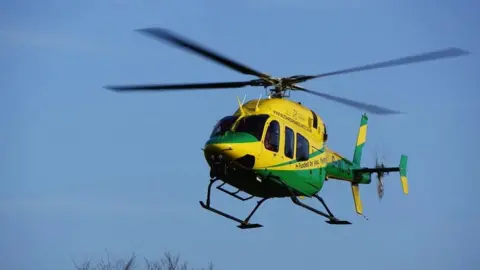Air ambulance says drone near misses going up
 Wiltshire Air Ambulance
Wiltshire Air AmbulanceAn air ambulance service said it has experienced some near-collisions involving drones.
Wiltshire Air Ambulance pilots say that the trend of drone collisions is going up and they are seeing more people fly drones over accident sites.
During one incident in Bath, they only narrowly avoided a drone as they were coming in to land.
Matt Wilcock, chief pilot at Wiltshire Air Ambulance, said: "When you hit one of those [drones] doing 150mph, they will come through the wind screen and they can injure the crew. If you injure the pilot, we all see where that would end."
He added: "When we come into landing sites, often what's happening is there's commotion on the ground, there's lights and people want to pop a drone up and have a look at what is going on.
"We come in and, while drones are at 400ft and most aviation traffic is at 500ft, the exception is when we come in to land.
"This hasn't happened too often, but the trend is on the up."
He added that when coming in to land at an accident site in Bath, his crew suddenly caught something coming against the aircraft.
"We realised it was a small drone.
"Had we hit that, it could have damaged us."
'Very stressful experience'
Gemma Alcock, founder and CEO of SkyBound Rescuer, who use drones for public safety, said: "Drone pilots who have bought a drone or received it as a gift often don't realise they are stepping into a very regulated space.
"Of course, being in the drone industry, you hear these stories all the time.
"Air ambulances, coast guard and police helicopters - I've heard these stories from them many times as well. I'm aware of the problem.
"A near-miss that doesn't lead to an impact can still be a very stressful experience for that helicopter pilot. It's unpredictable, so they weren't sure if that was going to cause a collision.
"They're flying to a time-critical, maybe life-critical incident and it could have an impact on that."
Follow BBC Wiltshire on Facebook, X and Instagram. Send your story ideas to us on email or via WhatsApp on 0800 313 4630.
